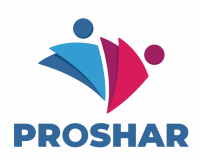How Does PROSHAR Work

What is PROSHAR?
A digital web-based solution to channel relief funds to the low-income population.
PROSHAR provides:
– Fastest relief transfer: in current models, relief starts once the fund-raising campaign ends. Funds are used to procure products, which are packaged, stored, transported, and manually physically. PROSHAR removes these costs; beneficiaries purchase products based on their choice with the donations in minutes from a designated local micro-merchant.
– Targeted relief transfer: PROSHAR works with communities, charities, foundations and NGOs to develop lists of the most vulnerable households. The transfer size is deliberately kept at TK 700 per week per family, which is about 60% of a household’s need on average. This narrows down the target beneficiaries to only those who are in dire need.
– Prioritize people’s choice: traditional models distribute rice, potato, oil, lentils, etc. Our research with low income population highlight reduction in protein and nutrition intake, especially for children, during times of crisis like the COVID-19. Households cut down on costs related to health, hygiene, and medicine. We can never define which household needs what. Therefore, PROSHAR lets people choose.
– Duplication removed: once a donation ticket is bought at www.proshar.org, our algorithm selects households randomly. When a household receives fund, they are automatically removed from the list for one week. This allows other households to get funded. The household re-appears on the list after one week. There is no possibility of double dipping.
– Relief for the rural economy: local micro-merchants are engaged in this model, and they catalyze the relief transfers. Traditional models distort the market for local groceries, kitchen market sellers, and mudir dokans. PROSHAR puts these merchants at the core. The relief money circulates in the local economy.
– Transfer made cheaper: traditional models are expensive. There is cost of selection, product purchase, bundling, transportation, branding. When all these costs are accounted for, a good part of your relief payment is already consumed. Most importantly, this varies largely, resulting in reduced amounts ultimately transferred to the beneficiaries. In our model, service charge is fixed at 10% for a relief ticket of TK 700. No matter where the beneficiary is, 10% is charged per beneficiary. Our system works like buying a product on an e-commerce store. There is nothing hidden.
How does PROSHAR work?
– Selection and enrollment of partner organization and campaign managers. PROSHAR partners with NGOs, charity organizations, foundations, and local campaign managers for support in beneficiary and merchant identification, on-boarding, training and monitoring purposes.
– Beneficiary and micro-merchant selection and on-boarding. Through partnership with partner organizations and campaign managers, PROSHAR on-boards beneficiary households in need of relief funds and maps micro-merchants within 15 minutes (walking distance) proximity. The selected beneficiaries and micro-merchants are provided dynamic phone training initially, and then furthered through in-person discussion with campaign managers.
– Donation collection. PROSHAR maintains live relief campaigns across different parts of the country. Donors (institutions or individuals) can see active donation campaigns on www.proshar.org and make donations with a few clicks. The system is very user-friendly and simple, just like an e-commerce purchase. A donor enters basic information (name, email address phone number) and selects the number of donation tickets. Each donation ticket costs TK 700 for a week for a family.
– PIN generation. Once the donor’s transaction is completed, PROSHAR algorithm identifies beneficiaries in the target location along micro merchants in their proximity. Both the beneficiaries and micro merchants receives a unique PIN. Following that, the
beneficiary can decide when to complete the transaction.
– Basket purchase and payment. The beneficiary visits their assigned micro-merchant’s shop, validates the PIN and purchases goods (food and non-food items) of their choice within the stipulated TK 700 – (10% of 700), that is within the budget of TK 630. Once the purchase is completed, the micro-merchant makes note of the items in the basket, shares the receipt via photo with the campaign manager, and PROSHAR automatically disburses the amount to the merchant’s mobile
wallet (including the cash-out charges).
– Data and analytics. At the backend of the process, PROSHAR platform collects information of the relief donations channeled, types of items purchased, variations in basket within the different weeks of disbursements, and produces gender segregated analytics. Key highlights of the analytics are presented on the website and social media.
– Monitoring and supervision. PROSHAR utilizes the network of the partner organizations and the campaign managers to ensure effective monitoring of the process, random cross-checking with the households to ensure there is no overlaps and the required items are purchased, and overall field data.
